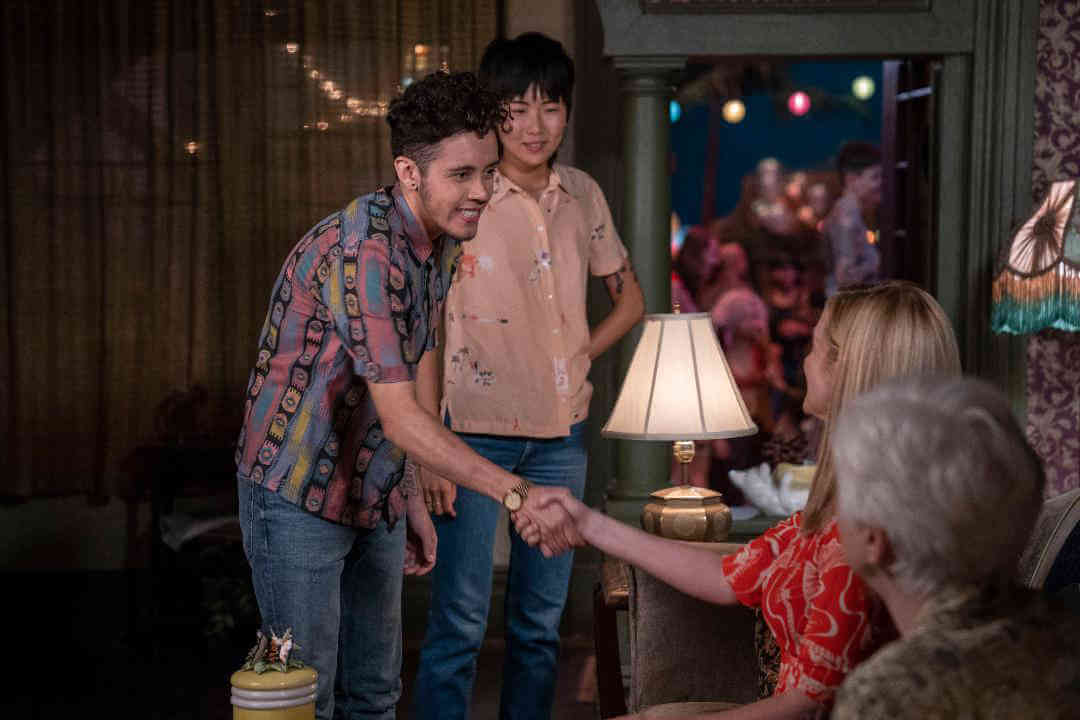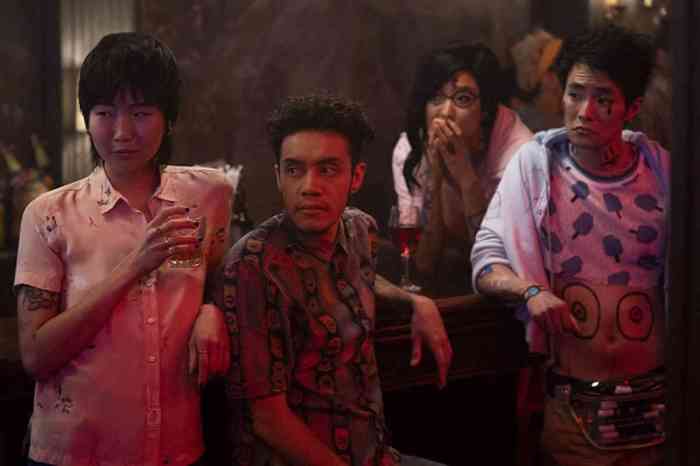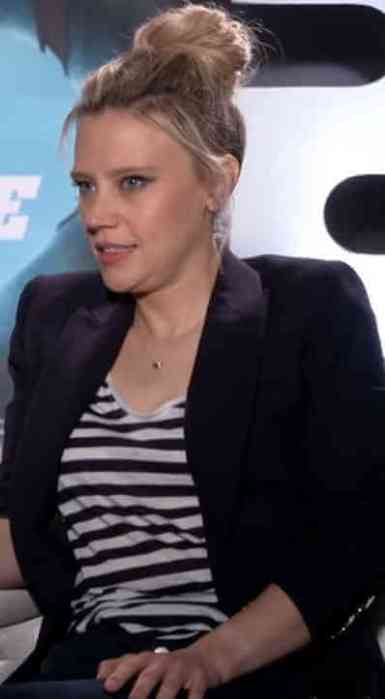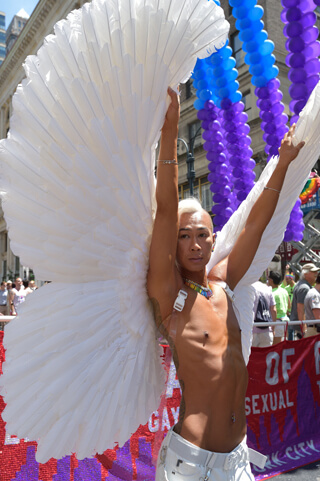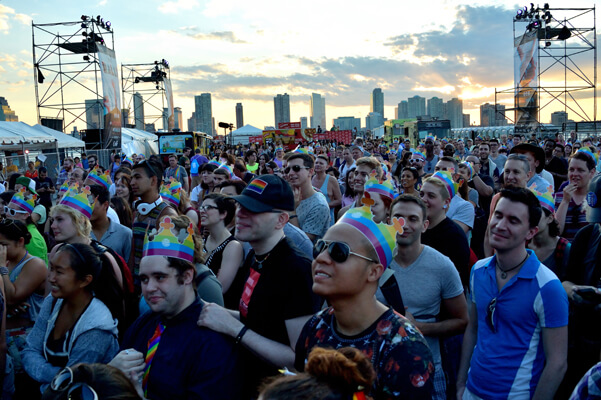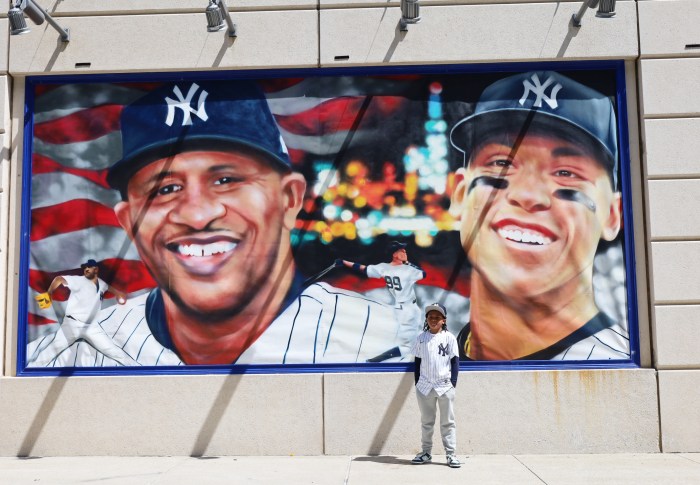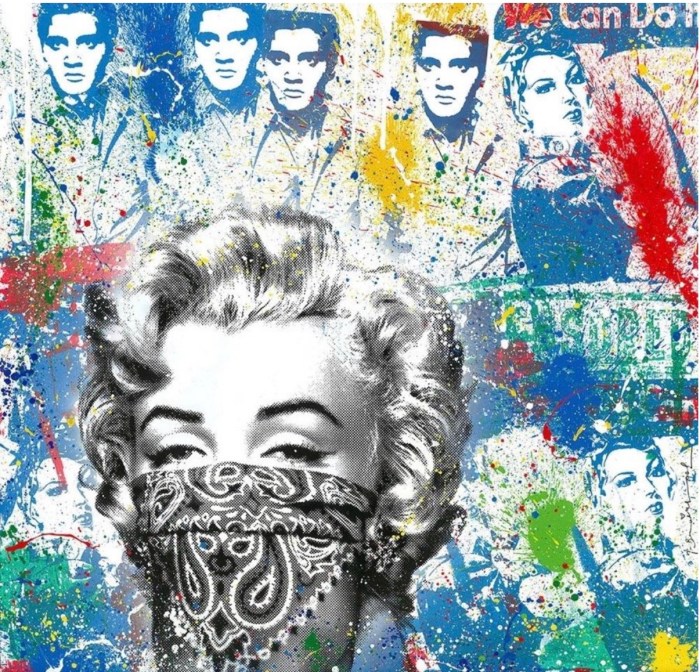Trans, non-binary actor Garcia makes an auspicious acting debut in “Tales of the City,” premiering June 7 on Netflix. This reboot of the popular series based on Armistead Maupin’s popular books, opens with Anna Madrigal (Olympia Dukakis) celebrating her 90th birthday. However, the party does not last long — she is soon being blackmailed and must sell 28 Barbary Lane.
One of the units in the apartment in the building is rented by Jake (Garcia), a trans man who lives with his lesbian girlfriend Margot (May Hong). As the couple faces the prospect of needing to find a new place to live, they also reconfigure their relationship. Jake is attracted to and wants to start seeing men. How things play out (in true soap opera style) is best left for viewers to binge on.
Garcia spoke with Gay City News about making “Tales of the City” in a recent phone interview.
GARY M. KRAMER: The series is based on the popular books. When — or did — you read them and how did you identify with the characters and stories?
GARCIA: I had no idea “Tales” existed until the audition, so I immediately did research on Armistead and the books. Someone gifted me the first one. Through my research, I saw the show and that it had this long queer history. My character doesn’t come in until seven or eight books into the series. It was interesting that Armistead wrote someone similar to me, as a trans person.
KRAMER: How did you create Jake and put a Garcia spin on the character?
GARCIA: I think it was the opposite. The writers made him for me. Jake is a little over two years into his transition, and I had transitioned just two years at the time of my audition. Jake’s exploration with men is close to an experience I had last summer. It was overwhelming in the best sense: someone is interested in putting this on screen. I didn’t know trans men until working on this with [episode director] Silas Howard and [series writer] Thomas Page McBee.
A character like Jake made me happy and excited. But I also thought: What does this mean? It’s a vulnerable role because Jake is complex — he’s struggling with his relationship with Margot, whom he loves, but he’s excited by being perceived differently by the world. These are things I have been dealing with. How do I play this character in all his vulnerability? It was fun and exciting to play.
KRAMER: Did you base Jake and Margot’s relationship on someone from your life?
GARCIA: Yes and no. I would always joke with past lovers: What would you do if I was a boy? I didn’t know I wanted to transition. They asked if that’s what I wanted. I was single when I started to fully perceive as male and I was working at my first gay bar and that was a whole world — to be desired by men and interested in men. I didn’t have a Margot, but I pulled from my personal life.
KRAMER: What do you think of this storyline as it relates to trans visibility and experience? The show has many trans talent in front of and behind the camera, but a cisgender actress plays a major transgender role.
GARCIA: We were well into the filming when I realized Olympia was playing trans. She’s grandmothered in from the original series. I worry that people will focus on that rather than the care and work that the show did. But the representation is phenomenal. You have people from all over the spectrum and all these storylines. Jake saying we’re queer, and Margot saying she wants to be a lesbian. A gay, biracial couple. Shawna is doing her own thing [a threesome]. There are all these layers and complexities, including a co-op with drag queens. These characters are not surface-level identity — you see their stories. That representation blends well to tell multiple stories from the queer community.
KRAMER: The series also shows the difficulties that trans people have had historically in finding work and housing, as well as facing discrimination and more. Can you talk about how things have (or haven’t) improved over time?
GARCIA: It’s rough. We had three trans women shot and killed this week. I think it’s changed over time in the sense that we’re getting our foot in the door and people are interested in us. Laverne Cox and Asia Kate Dillon are speaking on trans and non-binary people’s behalf. It’s a slow change. I can’t speak on how much it has changed because sometimes it feels like were taking steps back. Now that we can change our gender identity to X, that’s a very small space that trans and non-binary people deserve. There’s so much work that needs to be done.
KRAMER: Family is an important theme in “Tales.” Jake has a close, if contentious, relationship with their biological family but they also create a family with the folks at Barbary Lane. Armistead talks about a biological family and a logical family. Can you talk about the importance of family?
GARCIA: Armistead is a witty guy. I love him and the shit that comes out of his mouth. Wow. It’s so spot-on. As a queer person, it is so important to find people outside of your family. Unless you come from a super supportive biological home — and I don’t know anyone like that, myself included. They had to create their own home away from home, their own Barbary Lane. When I was in San Francisco and was at the premiere party, I met an older gay couple who said they moved to San Francisco because of Armistead’s books. Wanting to find a place to accept you because you have no place — I have done that. Because my own family loves me but not in the way I need them to. Or they don’t use our pronouns the way we want them to. We find a way to survive by creating homes that accept us and tell us we love us and are important and worth being alive. If people watch and feel there are people out there just like them and leave a not-okay situation to create their own Barbary Lane — I hope that happens.
KRAMER: Was there an Anna Madrigal in your life? A fairy godmother type?
GARCIA: [Laughs.] Yes, my old mentor, who is the reason I even started acting. We met at a train station in downtown Chicago. I performed a poem [at a club], and a month later they asked me to be in their play and introduced me to this whole new world of theater. Meeting other queer youth that had the same interest in creating theater that represented brown and black youth and giving me the space to share my voice and express it. Had it not been for that, I wouldn’t be in NYU, or New York, or in “Tales.” This was someone who cared and believed in me — that I can act and be a performer. I was 17, and that was my Anna Madrigal.
TALES OF THE CITY | Netflix | Premieres Jun. 7

